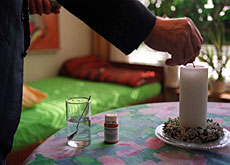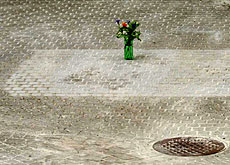Swiss more tolerant of euthanasia

A new study shows that Switzerland has one of the highest rates of euthanasia in Europe.
The report by the University of Zurich found that seven out of ten terminally ill people ended their lives through different types of euthanasia.
This was higher than in any other country in the European Union-sponsored study, which also included Belgium, the Netherlands, Denmark, Italy and Sweden.
The study examined 3,350 deaths in German-speaking Switzerland and found that half of them involved some form of euthanasia.
In almost one in three cases, passive euthanasia was applied, where doctors cut off life support.
However, active euthanasia, where specific steps are taken to end a patient’s life and which is still illegal in Switzerland, was more common in the Netherlands, where 2.6 per cent of deaths are related to this type of euthanasia.
Assisted suicide
Compared with its European neighbours, Switzerland also has the highest number of cases of assisted suicide – a fact that is partly due to the presence of various organisations offering this service, such as Dignitas or Exit.
Whereas active euthanasia is illegal in Switzerland, assisted suicide is not.
The difference is that with euthanasia, the doctor takes your life by administering a lethal drug. With assisted suicide, you have to be able to physically carry out that final act on your own.
About 0.4 per cent of the 60,000 deaths in German-speaking Switzerland each year are related to assisted suicide, amounting to around 500 people.
In the Netherlands, 0.2 per cent of deaths were linked to assisted suicide and in Belgium the figure is 0.01 per cent.
There were no recorded cases of assisted suicide in Sweden or Italy.
In the wake of the report, the Swiss Senate has decided to put forward a new proposal for a law on euthanasia and assisted suicide. It has commissioned the Swiss Ethics Commission to draw up a document.
Controversy
Last year Dignitas, one of four organisations offering assisted suicide in Switzerland, came under fire for offering its services to foreigners and the mentally ill.
Since then, the Zurich authorities have voiced their anxiety that Switzerland might become a centre for people wishing to take their own lives.
Most of the people who have used the group’s services have been terminally ill but, controversially, some have been suffering from mental illnesses.
swissinfo with agencies
Direct active euthanasia is taking specific steps to cause the patient’s death, such as injecting the patient with drugs. This is usually an overdose of painkillers or sleeping pills. This kind of euthanasia is illegal in Switzerland.
Indirect active euthanasia is giving the patient a palliative that could lead to death. This kind of euthanasia is allowed in Switzerland.
Passive euthanasia is usually defined as withdrawing medical treatment with the deliberate intention of causing the patient’s death and is legal in Switzerland.
Assisted suicide is when a doctor provides a patient with the means to end his own life; however, a doctor does not administer it. Assisted suicide is tolerated in Switzerland.

In compliance with the JTI standards
More: SWI swissinfo.ch certified by the Journalism Trust Initiative










You can find an overview of ongoing debates with our journalists here . Please join us!
If you want to start a conversation about a topic raised in this article or want to report factual errors, email us at english@swissinfo.ch.